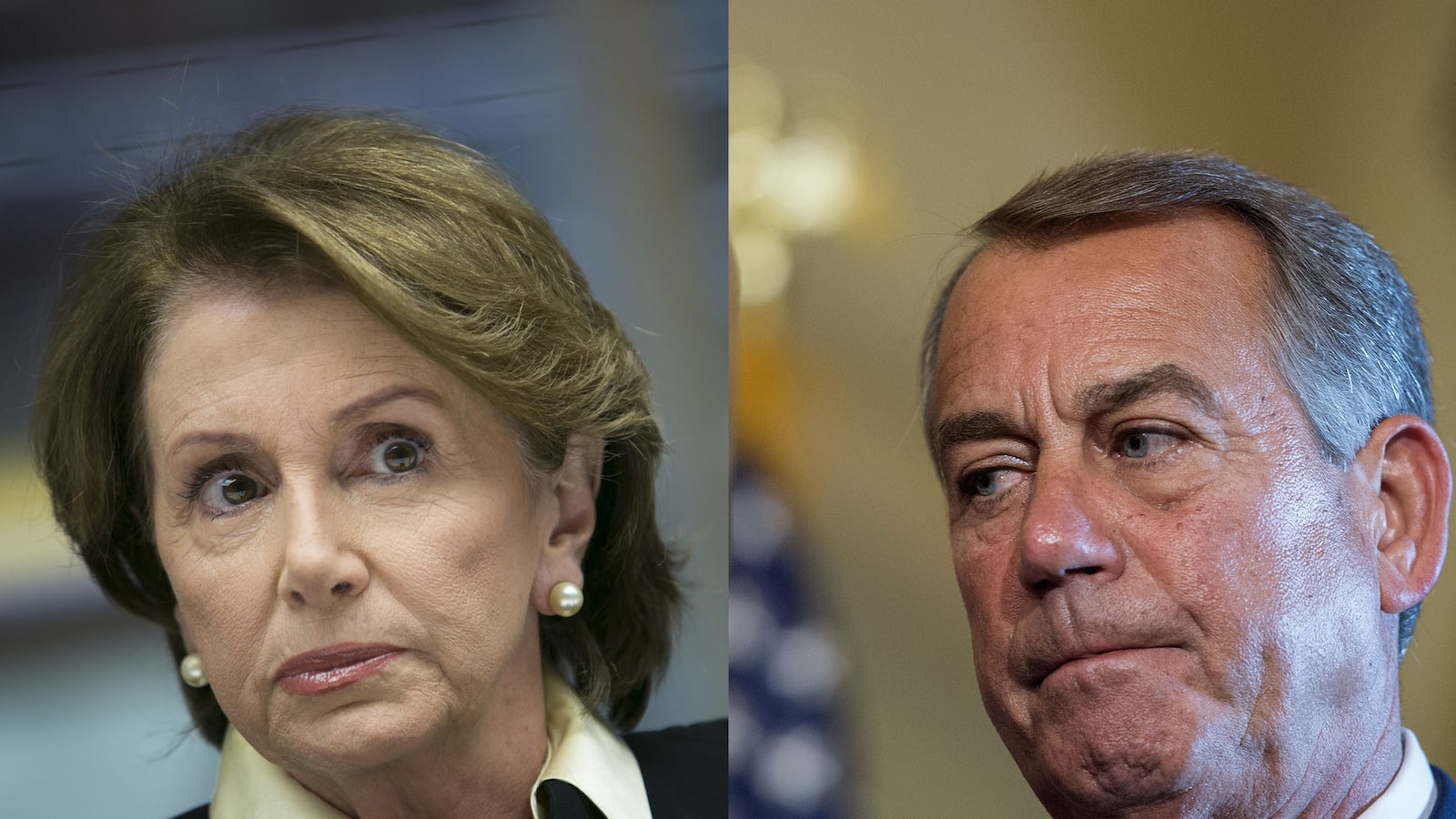Democrats were going to make an epic stand Thursday night. They were going to draw “a line in the sand,” according to New York Rep. Steve Israel, and make clear that they would not fold over a fight about a provision in the “cromnibus” that would deregulate derivatives trading by big banks. This was the big showdown where House Democrats would show their muscle and establish their populist credentials for the next Congress despite pressure from the White House. And, of course, they caved.
Late Thursday night, the House passed the combination continuing resolution/omnibus spending bill by a vote of 219-206. Fifty-seven Democrats, including Steny Hoyer and Jim Clyburn, the No. 2 and No. 3 in their leadership, voted for the bill. The consequence of its failure wouldn’t have been a government shutdown but a three-month CR that would keep the government open through Feb. 27, 2015, and set the stage for a new showdown then.
The Democratic supporters of the bill were mostly relatively moderate and pro-business and none were enthusiastic about the legislation. As Rep. Joe Crowley of New York told reporters, “There was no right answer and no wrong answer.” It did seem many were pushed to support it by the White House’s advocacy for the bill and House leadership did not force members to make a decision either way—although a letter from Nancy Pelosi to House Democrats did contain the passive-aggressive passage: “However you decide to vote in the end, I thank those who continue to give us leverage to improve the bill.”
White House Chief of Staff Denis McDonough presented the administration’s case to the House Democratic Caucus on Thursday night. He argued that the bill was a better deal than the party would get in the next Congress. This was an argument that some Republicans agreed with, including Rep. Candice Miller of Michigan, who said, “If we go to a three-month continuing resolution, I think [it] will be much worse for the Democrats.” She added “but it’s their call.”
It turned out enough Democrats did blink despite an ad hoc whipping effort organized by Rep. Maxine Waters, (perhaps the only member of Congress to ever receive a shoutout from rapper KRS-One) to keep members onside. She was aided in this by a number of impassioned speeches in the Democratic caucus, including one from civil-rights hero Rep. John Lewis of Georgia, who referenced his participation in the March on Washington 50 years ago. “I wanted to know [then] which side the federal government was on,” said Lewis. “I wanted to know 50 years later which side is the Democratic caucus on? Is it on the side of the people or Wall Street and the big banks?
In contrast, even though McDonough “was somewhat tepidly received” in the Democratic caucus meeting by members, according to Rep. Peter DeFazio of Oregon, the speech from Lewis and the calls from Waters and other members working with her eventually carried less sway than those from President Obama and Vice President Biden.
The pill that Democrats had trouble swallowing was a provision rolling back Dodd-Frank that would allow major banks to carry out certain risky derivatives trades through funds insured by the FDIC. The idea of weakening financial reform only years after a financial crisis that almost brought down the American economy alarmed many Democrats. As Corrine Brown of Florida told The Daily Beast while almost holding back tears, “I think we care about all the people who lost their homes during the foreclosure and you giving the banks the opportunity to do it again, not one of them went to jail.”
The concern wasn’t just centered around ideological opposition but political calculus as well. As DeFazio told reporters, “You know, if I go home and say, ‘I had to vote to give new special interests to billionaires and the big Wall Street banks even though people in my district are still hurting because otherwise we would have had a [90-day continuing resolution],’ you know what they’re gonna say? What the hell is a 90-day continuing resolution? You did that for Wall Street and the rich people and we’re done with you Dems.”
The concern now was whether Democrats had blown all their credibility and negotiating room in the next Congress by allowing the cromnibus to pass Thursday. Rep. Hank Johnson of Georgia, an opponent of the legislation, said before the vote that if it passed, “it’ll send a message that if you wait the Democrats out, they will fold at the last moment. [Republicans] can depend on outmuscling us in the future.”
The melee over whether Democrats supported the bill detracted from the fact that House Republicans were about as organized as usual. Sixty-seven Republicans voted against it, a margin in line with estimates of many conservatives from earlier in the day. The opponents in the GOP caucus were the usual conservative suspects, upset about the fact that the bill did not defund Obama’s executive order on undocumented immigrants. Strangely, these conservatives shared the same goal of a short-term resolution as Democrats: Republicans because they thought it would strengthen their hand on immigration and Democrats because it would serve as a symbol of their newfound steadfastness. Neither achieved those goals. But both laid down significant markers for the future.
Steve Scalise, the new Republican whip, crowed after the vote that “tonight we set the stage for a battle with the president on his illegal actions when we have a Republican Senate in just four weeks.” He then added “that battle will be very viciously fought.” The question is whether the cromnibus, which won’t tie the immigration fight to a potential government shutdown, hurt the GOP’s leverage in that fight. Some ardent Republicans like Steve King of Iowa were “not optimistic” about what immigration hawks could do in the next Congress if the cromnibus passed.
In contrast, some progressive Democrats took a longer view. They accepted the fact that their party would have to make deals and sacrifice priorities in 2015. However, they hoped that the fight would at least make further attempts to roll back financial reform not worth the effort for Republicans, who would try to make deals on other issues instead.
Certainly Democrats laid a marker down for the next two years. The House caucus appears to be far more populist, feisty, and ready to push the debate on economic issues than it has in the past. After all, a significant majority defied the White House to vote against the bill. The question though is whether they will be able to do a better job holding together in the next two years against an increased Republican majority in the House and with Mitch McConnell now leading the Senate. It’s clear after this vote that House Democrats are spoiling for a fight. It’s just uncertain whether they’ll be able to land any punches.






